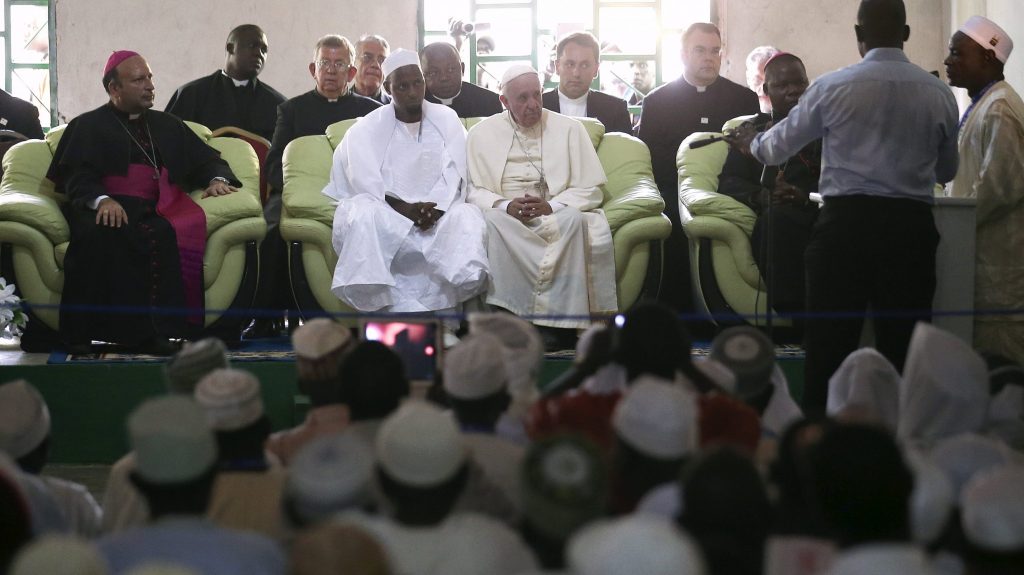Pope Francis called Wednesday for peace in the Central African Republic following a disputed election.
In his Angelus address on Jan. 6, the Solemnity of the Epiphany of the Lord, the pope expressed concern about the turmoil following a Dec. 27 vote to elect the country’s president and National Assembly.
“I am following carefully and with preoccupation the events in the Central African Republic where elections recently took place in which the people have manifested the desire to pursue the path of peace,” he said.
“I invite all of the parties to a fraternal, respectful dialogue, to reject any form of hatred and to avoid any form of violence.”
Pope Francis has a deep connection with the impoverished, landlocked nation that has suffered from civil war since 2012. In 2015, he visited the country, opening the Holy Door of the Catholic cathedral in the capital, Bangui, ahead of the Year of Mercy.
Sixteen candidates stood in the presidential election. Faustin-Archange Touadéra, the incumbent, claimed re-election with 54% of the votes, but other candidates said the vote was marred by irregularities.
A Catholic bishop reported Jan. 4 that rebels supporting a former president had seized the city of Bangassou. Bishop Juan José Aguirre Muñoz appealed for prayers, saying that children caught up in the violence were “very frightened.”
As a precaution against the spread of the coronavirus, the pope delivered his Angelus address in the library of the Apostolic Palace, rather than at the window overlooking St. Peter’s Square, where crowds would gather.
In his address before reciting the Angelus, the pope noted that Wednesday marked the Solemnity of the Epiphany. Referring to the day’s first reading, Isaiah 60:1-6, he recalled that the prophet had a vision of a light amid the darkness.
Describing the vision as “more timely than ever,” he said: “Certainly, the darkness is present and threatening in everyone’s life and in the story of humanity; but God’s light is more powerful. It needs to be welcomed so that it might shine on everyone.”
Turning to the day’s Gospel, Matthew 2:1-12, the pope said that the Evangelist showed that the light was “the Baby of Bethlehem.”
“He was born not only for some but for all men and women, for all peoples. The light is for all peoples, salvation is for all peoples,” he said.
He then reflected on how Christ’s light continued to spread in the world.
He said: “It does not do so through the powerful means of this world’s empires who always seek to seize power. No, Christ’s light spreads through the proclamation of the Gospel. Through proclamation … by word and witness.”
“And with this same ‘method,’ God chose to come among us: the Incarnation, that is, by drawing near to the other, encountering the other, assuming the reality of the other and bringing the witness of our faith, everyone.”
“This is the only way that Christ’s light, who is Love, can shine in those who welcome it and attract others. Christ’s light does not expand only through words, through fake methods, commercial ones… No, no, through faith, word and witness. Thus the light of Christ expands.”
The pope added: “Christ’s light does not expand through proselytism. It expands through witness, through the confession of the faith. Even through martyrdom.”
Pope Francis said that we should welcome the light, but never think we possess it or should “manage” it.
“No. Like the Magi, we too are called to allow ourselves to be fascinated, attracted, guided, illuminated and converted by Christ: He is the journey of faith, through prayer and the contemplation of God’s works, who continually fills us with joy and wonder, an ever new wonder. That wonder is always the first step to go forward in this light,” he said.
After reciting the Angelus, the pope made his appeal for the Central African Republic. He then offered Christmas greetings to “the brothers and sisters of the Oriental Churches, Catholic and Orthodox,” who will celebrate the Nativity of the Lord on Jan. 7.
Pope Francis noted that the feast of the Epiphany also marked World Missionary Childhood Day, instituted by Pope Pius XII in 1950. He said that many children around the world would be commemorating the day.
“I thank each one of them and I encourage them to be joyful witnesses of Jesus, seeking to always bring fraternity among your peers,” he said.
The pope also sent a special greeting to the Three Kings Parade Foundation, which, he explained, “organizes events of evangelization and solidarity in numerous cities and villages in Poland and in other nations.”
Concluding his address, he said: “I wish you all a happy feast day! Please do not forget to pray for me.”

